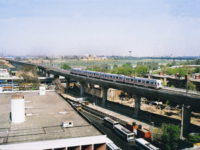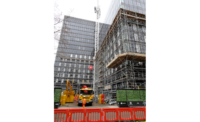Egypt Awards $4.5B Contract for First Phase of High-Speed Rail

Consortium will build 660 km of high-speed rail in Egypt. Rendering courtesy of Siemens
Egypt’s National Authority for Tunnels (NAT) has awarded a $4.5-billion rail construction contract, on an engineering-procurement-construction + finance basis, to a consortium of Germany’s Siemens Mobility and Egyptian firms Orascom Construction S.A.E. and The Arab Contractors for the first phase of a planned 1800-kilometer high-speed electrified rail line.
Phase one of the project entails construction of 660 km of rail, with at least 18 stations. Orascom and Arab Contractors will carry out the track-laying works for the line that will link the port city of Ain Sokhna on the Red Sea to Marsa Matrouh and Alexandria on the Mediterranean Sea. The alignment will run along the sandy Mediterranean Coast line to the western edge of the Nile delta, around Cairo and then to the Red Sea in a more sandy environment, according to a Siemens spokesperson.
The consortium has also been awarded a 15-year maintenance contract for the track works and telecommunication system.
Siemens will install the line’s signaling system based on modern computer-based interlocking technology and European Train Control System (ECTS) Level 2 and the power supply system.
Egypt will be the third country in Africa to award a contract using ECTS Level-2, after Morocco and Libya which previously contracted Italian-based international technology company, Ansaldo STS.
Siemens will also supply the Velaro high-speed trains, Desiro high-capacity regional train sets and Vectron freight locomotives. Siemens’ total share of the contract would be $3 billion for the project that is Egypt’s the first-ever high-speed, electrified main and freight rail line.
NTA will construct the bridges and facilitate sub-construction for the project that is expected to create a total of 18,800 jobs and move an estimated 30 million passengers annually on the new line that reduces travel time by 50% and increase Egypt’s volume of freight via rail by 15% from the current 5%.
The consortium is also expected to pick the order for the two remaining additional lines of 1140 km connecting the Greater Cairo region from the 6th October City along the Nile River with Aswan and Luxor via Hurghada to Safaya.
Financial close for Phase One, which will connect a series of sea and dry ports, is expected in 2022 and operations are likely to commence in 2023.
The project will “reduce primary energy usage and overall air pollution by cutting carbon emissions by 70%, in comparison to the current emissions from car and bus transportation” according to Orascom.



